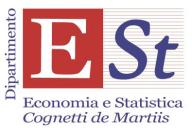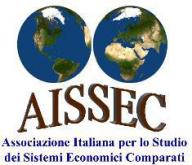Edited by Marta Marson and Luca Bortolotti, University of Turin and OEET
The role that GVCs can play in the process of economic development was at the core of the recent 7th OEET workshop on Emerging economies in Global Value Chains: impacts and policy issues. The workshop saw the participation, among the others, of Roberta Rabellotti, Giorgia Giovannetti and Elisabetta Gentile, three OEET members whose works (with co-authors) are collected in this newsletter. Through different methodologies and datasets, the newsletter suggests novel evidences and perspectives to measure the relation between economic development and participation in GVCs.
In the last decades, with the emergence of Global Value Chains (GVCs), the tasks and functions for the production of goods and services have become increasingly specialized and fragmented across different countries. On the one hand, this phenomenon, as well as macro-regional networks, has played a role in boosting growth in many developing and emerging economies. Indeed, while building whole industries from scratch can be hardly achieved by developing countries, entering in specific phases of production is much easier. On the other hand, GVCs can trigger unbalances, inequality, marginalization of the working class (particularly in high income countries) and environmental degradation, creating a context more vulnerable to climate crisis and shocks in international prices and logistics. Moreover, the integration of developing countries in GVCs is often limited and, when it occurs, reserves the larger share of value added to high-income countries.
Newsletter n. 21 | April 2021 - Download PDF
The first article in this newsletter is by Carlo Pietrobelli and Roberta Rabellotti and provides an insightful conceptualization of GVCs in terms of task (i.e. functional specialization), linkages (i.e. knowledge spillovers), and firms (i.e. the microeconomic/fine grained approach that is necessary to study and address GVCs related issues). These notions will allow the reader to capture the peculiar changes introduced by GCVs’ development.
The second article, by Giorgia Giovannetti and Arianna Vivoli, investigates the effects of the restrictions and lockdown measures which followed the covid-19 pandemic on firm performances. After reviewing the literature on this topic, the World Bank Enterprise Surveys data are used to compare the reaction of domestic and international actors. The article formulates then various hypothesis about the different capacity in overcoming the covid shock.
Last, the article by Elisabetta Gentile and Gaaitzen J. de Vries, explores how participation in GVC by fifteen developing countries from Asia compares with that of OECD countries. The comparison includes scale of participation and productivity of labour, and further distinguishes between production activities and knowledge intensive activities to identify where the gaps are actually found.









